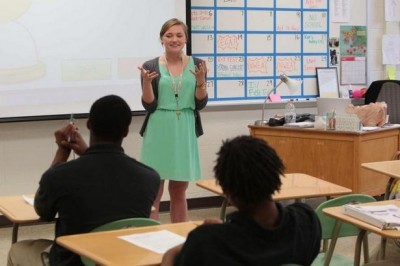Study: New teachers more educated, of higher caliber
This from the
Hechinger Report:
Teaching may be attracting a more academically successful group
of people compared to previous years, according to a new study released
Wednesday.
Two researchers at the University of Washington examined four
national data sets to determine how the characteristics of first-year
teachers changed between 1993 and 2010. The study
found that more new teachers have advanced degrees than ever before.
During the 2007-08 school year, 26 percent of new teachers entered the
classroom with a master’s degree, compared to 17 percent two decades
earlier.
 First-year
teachers during the 2008-09 school year had an average SAT score that
was 8 percentile rank points higher than the average score among new
teachers in 2001. And for the first time, new teachers in 2008 had
slightly higher average SAT scores than their peers entering other
fields.
First-year
teachers during the 2008-09 school year had an average SAT score that
was 8 percentile rank points higher than the average score among new
teachers in 2001. And for the first time, new teachers in 2008 had
slightly higher average SAT scores than their peers entering other
fields.
Research
has found that a master’s degree does not necessarily guarantee, or
even improve teacher quality. But a teacher’s cognitive skills and literacy skills, as measured by the SAT or other national exams, have been found to positively impact student achievement.
“The data are encouraging,” wrote the authors of the study, Dan
Goldhaber and Joe Walch. “[This] may represent a reversal of the
long-term trend of declining academic talent entering teaching.”
For years, colleges of education have battled reputations that they
attract students with low test scores and grade point averages.
According to a 2011 College Board report,
SAT takers planning to major in education scored an average of 480 in
reading—above some, but below most disciplines, including law,
engineering, and psychology.
In 2006, Arthur Levine, the former president of Teachers College, Columbia University, published a lengthy report
on the state of teacher education, calling it a “troubled field” and
criticizing schools of education for having low admission and graduation
standards, and “wide disparities in institutional quality.” Aspiring
teachers in California, for example, must only score a 51 percent
on the California Basic Educational Skills test, which is a required
exam for those applying to any teacher preparation programs in the
state.
Nationally, there has been a push to improve the quality of teacher candidates. In February, the Washington D.C. based Council for Accreditation of Educator Preparation
proposed new standards for teacher preparation programs, including
increased candidate quality and selectivity. The standards suggest that
schools only admit candidates with a minimum average GPA of 3.0, and
call for each admission group to have an average performance in the top
third of scores on academic-admissions tests like the ACT.
Earlier this year, the state of Delaware raised admission standards for the state’s teacher-preparation programs, requiring an average GPA of 3.0 or in the top 50th percentile for recent coursework. New Jersey is considering similar legislation, and the State University of New York
announced this year that beginning in 2015, students must have a 3.0
GPA and pass a new exam to qualify for the teacher preparation program.
The study’s authors say they are unsure why new teachers are of a
higher academic caliber, but suggest that it may have to do with the
labor market. In 2001, the unemployment rate was only 5 percent,
according to the Bureau of Labor Statistics. By 2009, the rate had
increased to 9 percent, possibly prompting more high-scoring graduates
to pursue relatively stable teaching jobs instead of occupations
impacted by the economy. “It is unclear,” the authors wrote, “whether
this improvement reflects a temporary response to the economic downturn
or a more permanent shift.”
First-year teachers during the 2008-09 school year had an average SAT score that was 8 percentile rank points higher than the average score among new teachers in 2001. And for the first time, new teachers in 2008 had slightly higher average SAT scores than their peers entering other fields.
1 comment:
I think if you look at the teacher training program popularity in relationship to U.S. historical periods of social and/or economic strife, you will find our profession attracts folks during periods of greater instability.
There has never been a shortage of candidates entering the profession, the problem lies in retention. How many of these higher SAT, master degree folks stick with the profession is the real question.
I would propose that folks with greater intellect and advanced degrees will have a tendancy to leave the profession even quicker than their lesser qualified colleagues enter the profession. I say this because the profession to me is increasingly becoming one which has sold out its ideals and the importance of intrinsic dispositions and personal qualities. It's leaders tout the "science" of learning and the quantitiatve basis for measuring teacher effectiveness. I believe that the increasing focus on documentation, report writing, regulatory compliance and obsession with annual test scores for the purpose of ensuring that teachers are doing their job will result in these high flyers leaving the profession out of frustration. The system places very little if any confidence in them as professionals and instead treats them with the assumption that they are not doing an adequate job and must be systematically monitoried and meassured based on annual student test scores for which they control only a fraction of the conditions which impact student performance. Adults don't train for a profession, only to be treated like children who can't be trusted to do the right thing. These folks have other options and I assume, as in the past, they will simply leave the profession like about 50%+ of the folks who get trained to be teachers.
Post a Comment